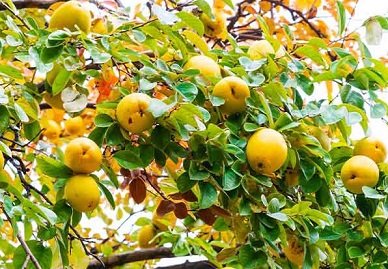Herbs And Phytochemicals: The Antidepressant Properties of Chaenomeles Sinensis Fruit Extract
Nikhil Prasad Fact checked by:Thailand Medical News Team May 29, 2024 10 months, 2 days, 15 hours, 50 minutes ago
Herbs And Phytochemicals: The search for effective and safe treatments for depression has led researchers to explore natural products, including herbs and phytochemicals. One such promising candidate is the extract of Chaenomeles sinensis, commonly known as Chinese quince. This fruit, traditionally used in East Asian medicine, has recently been studied for its potential antidepressant properties. In this
Herbs And Phytochemicals news report, we delve into the findings of a study conducted by the Korea Food Research Institute, which explored the antidepressant-like effects of Chaenomeles sinensis fruit extract (CSFE) through in vivo experiments and molecular docking studies.
 Herbs And Phytochemicals: The Antidepressant Properties
Herbs And Phytochemicals: The Antidepressant Properties
of Chaenomeles Sinensis Fruit Extract
The Science Behind Depression and the Role of CSFE
Depression is often associated with hyperactivity of the hypothalamic-pituitary-adrenal (HPA) axis, leading to excessive production of stress hormones such as corticosterone (CORT). Elevated CORT levels can increase the activity of monoamine oxidase (MAO), an enzyme that degrades neurotransmitters like serotonin and dopamine, which are crucial for mood regulation. The breakdown of these neurotransmitters can result in neurotoxicity and the symptoms of depression.
To counteract these effects, MAO inhibitors are often used. However, their clinical use is limited due to significant side effects, such as hypertensive crises. This has spurred interest in alternative treatments, including natural products like CSFE, which may offer antidepressant benefits with fewer side effects.
Study Overview
Researchers investigated the antidepressant-like effects of CSFE in male ICR mice subjected to CORT-induced depression. The study involved administering different doses of CSFE (30, 100, and 300 mg/kg) and a known MAO inhibitor, selegiline, as a positive control. The mice received daily injections of CORT (40 mg/kg) for 21 days to induce depression-like behaviors. Various behavioral tests were conducted to assess the effects of CSFE on depression and anxiety.
Behavioral Tests and Results
-Tail Suspension and Forced Swim Tests
These tests measure depressive-like behaviors based on the immobility time of the mice. Mice treated with CSFE showed a significant reduction in immobility times compared to the control group, indicating an antidepressant effect. The highest dose of CSFE (300 mg/kg) was particularly effective.
-Elevated Plus Maze Test
This test assesses anxiety-like behavior by measuring the time spent in open versus closed arms of the maze. CORT-treated mice exhibited increased anxiety, spending less time in the open arms. However, CSFE treatment significantly improved this behavior, with the highest dose again showing the most notable effect.
-Passive Avoidance Test
Memory im
pairment is a common symptom of depression. In this test, mice treated with CSFE demonstrated improved memory retention, as evidenced by increased step-through latency times compared to the control group.
-Open Field and Rotarod Tests
These tests were used to evaluate locomotor activity and motor coordination. The study found no significant differences in locomotor activity or motor coordination among the groups, indicating that the antidepressant effects of CSFE were not due to changes in general activity levels.
Molecular Docking Analysis
To understand the molecular mechanisms underlying the antidepressant effects of CSFE, researchers conducted molecular docking studies. These analyses revealed that key compounds in CSFE, such as chlorogenic acid (CGA) and neo-chlorogenic acid (neo-CGA), strongly bind to the active site of MAO-B, similar to the binding of the reference inhibitor safinamide. This suggests that these compounds may inhibit MAO-B activity, thereby preventing the breakdown of important neurotransmitters.
Discussion
The study's findings highlight the potential of CSFE as a natural antidepressant. The significant improvements in depressive and anxiety-like behaviors, coupled with enhanced memory function, suggest that CSFE could be a valuable alternative to traditional MAO inhibitors. The molecular docking analysis supports this by showing that CSFE's active compounds effectively inhibit MAO-B, similar to known pharmaceutical inhibitors.
Conclusion
The exploration of Chaenomeles sinensis extract opens new avenues for the treatment of depression with natural products. While further research is needed to fully understand its mechanisms and long-term efficacy, the initial findings are promising. CSFE offers a potential natural remedy with antidepressant and anxiolytic properties, presenting an alternative for those seeking treatments with fewer side effects compared to conventional antidepressants.
The study findings were published in the peer reviewed International Journal of Molecular Sciences.
https://www.mdpi.com/1422-0067/25/11/5838
For the latest on
Herbs And Phytochemicals, keep on logging to Thailand Medical News.
Read Also:
https://www.thailandmedical.news/news/landmark-study-shows-that-single-dose-of-psychedelic-drug-psilocybin-produced-antianxiety-and-antidepressant-effects-that-last-for-years
https://www.thailandmedical.news/news/crispr-technology-to-help-solve-depression
https://www.thailandmedical.news/news/study-shows-resveratrol-in-red-wine-treats-depression-and-anxiety
